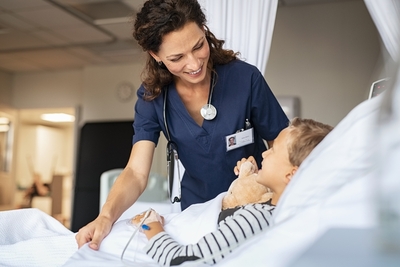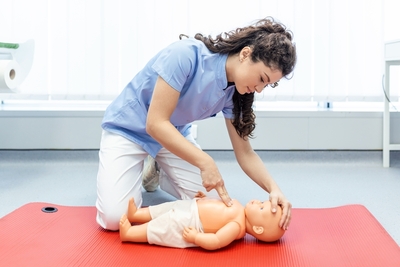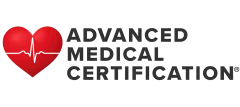What is PALS Certification for Nurses?
More than 15,000 children receive CPR for in‐hospital cardiac arrest every year in the United States. As many as 80% to 90% of them survive these pediatric emergencies thanks to the skilled nurses and healthcare professionals who were calm under pressure, trained to act, and ready to save a life.
Pediatric Advanced Life Support (PALS) certification was created for moments like these. It gives nurses the specialized training they need to recognize and respond to critical emergencies in infants and children, whether it’s respiratory failure, shock, arrhythmias, or cardiac arrest.
While Basic Life Support (BLS) and Advanced Cardiac Life Support (ACLS) are important foundations, PALS goes further. It focuses on the unique needs of pediatric patients and the rapid decision-making required to stabilize them in life‐threatening situations.
For nurses working in ERs, ICUs, pediatric units, or anywhere children receive care, a PALS certification proves you are ready for the moments that matter most.
Who Needs PALS Certification in Nursing?
 Not all nurses are required to hold a Pediatric Advanced Life Support certification. It depends largely on your role, the patient population you serve, and your clinical setting, but a PALS certification is typically required for nurses who care for infants and children in critical or emergency situations. This includes:
Not all nurses are required to hold a Pediatric Advanced Life Support certification. It depends largely on your role, the patient population you serve, and your clinical setting, but a PALS certification is typically required for nurses who care for infants and children in critical or emergency situations. This includes:
- Pediatric nurses in hospitals or specialty clinics
- Emergency room (ER) nurses, especially those in family‐focused or general EDs
- Intensive care unit (ICU) nurses, including pediatric and neonatal ICU (PICU/NICU) roles
- Transport and flight nurses who may respond to pediatric emergencies
- School nurses or those working in pediatric urgent care settings
- Nurse practitioners (NPs) and clinical nurse specialists (CNSs) focusing on pediatric populations
PALS vs. BLS for Nurses: What’s the Difference?
The Basic Life Support certification is required for all nurses, regardless of specialty, as it focuses on foundational skills like chest compressions, rescue breathing, and the use of an AED. It’s a must‐have credential for any nurse working in a clinical setting.
PALS, on the other hand, is an advanced, pediatric‐specific certification. It builds on the principles of BLS, offering a deeper dive into pediatric assessment, emergency interventions, and team‐based resuscitation strategies. BLS is the starting point and PALS provides the tools needed to confidently manage complex pediatric emergencies.
PALS vs. ACLS for Nurses: Do You Need Both?
Whether you need both PALS and ACLS depends on the patient populations you treat. ACLS is centered on adult patients’ emergency care, including cardiac rhythms, stroke management, and pharmacological interventions. It’s commonly required for nurses in adult ICUs, cardiac units, and emergency departments.
PALS, by contrast, is tailored specifically to infants and children. If you work in a mixed unit, float between pediatric and adult care, or are a nurse in an emergency department that sees patients of all ages, both certifications may be required.
What Does PALS Certification Cover?
PALS certification prepares nurses and other healthcare providers to deliver life‐saving care in pediatric emergencies. The course is designed around the latest evidence‐based practices and follows the most recent guidelines from the International Liaison Committee on Resuscitation (ILCOR). Here’s what you can expect to learn:
- Pediatric CPR and Airway Management
- Recognizing and Treating Pediatric Emergencies
- Pharmacology for Pediatric Patients
- Team‐Based Resuscitation Skills
How to Get PALS Certified as a Nurse
 Getting your PALS certification as a nurse is a straightforward process, and it starts with selecting a course that fits your learning style and schedule. To enroll, you must already be proficient in BLS skills, particularly CPR for infants and children. While there are no formal prerequisites beyond that, it’s helpful to have experience in emergency or pediatric care, as the course builds on clinical knowledge and rapid assessment skills.
Getting your PALS certification as a nurse is a straightforward process, and it starts with selecting a course that fits your learning style and schedule. To enroll, you must already be proficient in BLS skills, particularly CPR for infants and children. While there are no formal prerequisites beyond that, it’s helpful to have experience in emergency or pediatric care, as the course builds on clinical knowledge and rapid assessment skills.
The time it takes to complete your PALS certification varies based on the format and your familiarity with the material. Some nurses finish their coursework in just 7–8 hours, especially when taking an online course that allows for self‐paced progress. Others may prefer a traditional in‐person setting, which usually spans one to two full days, depending on whether it’s an initial certification or a renewal.
Both online and in‐person PALS courses follow the same ILCOR‐guided curriculum, but online options offer more flexibility. These programs include digital handbooks, interactive modules, and a final exam you can take from any device, at your own pace. Many nurses choose online certification for its convenience, especially when balancing clinical shifts and personal responsibilities.
To prepare for the PALS exam, review the provider handbook thoroughly, study the algorithms, and become familiar with case‐based scenarios. The exam typically tests your ability to assess pediatric emergencies, apply the right interventions, and understand medication protocols.
PALS Certification Cost and Renewal
The price of PALS certification can vary depending on the provider and the course format. In general, online certification tends to be more affordable than in‐person options. For example, Advanced Medical Certification offers flexible, online PALS certification and recertification options, for just $159.
Once earned, your PALS certification is valid for two years. After that, renewal is required to ensure you stay current with the latest guidelines and protocols in pediatric emergency care. Medical science is always evolving, and PALS standards are updated regularly by ILCOR, so renewing your certification helps keep your skills sharp and evidence‐based.
Renewing your PALS certification as a nurse follows a similar process to the original course but is often in a more condensed format since it assumes prior knowledge. Many nurses choose to renew online for the convenience and flexibility.
Frequently Asked Questions About PALS for Nurses
Is PALS Required for ER Nurses?
In most cases, yes. Emergency room nurses frequently care for patients across all age groups, including infants and children. Because pediatric emergencies require specific assessment and intervention techniques, many hospitals require ER nurses to hold a current PALS certification as part of their onboarding or credentialing process.
Do NICU and PICU Nurses Need PALS?
Yes. Nurses working in neonatal and pediatric intensive care units (NICU and PICU) are expected to respond to complex and high‐risk pediatric cases. PALS certification proves these nurses are equipped with the latest protocols for recognizing and managing respiratory failure, cardiac arrest, and shock in infants and children. It’s considered a standard requirement in most critical care pediatric environments.
Does PALS Certification Help Nurses Advance Their Careers?
Absolutely. By showing your commitment to specialized skills and evidence‐based care, PALS certification can open doors to opportunities in emergency medicine, critical care, pediatrics, and leadership roles that involve team‐based resuscitation.
Can Nursing Students Take PALS Certification?
Yes, nursing students can take a PALS course before graduation. While not always required during nursing school, early certification can give students a head start when applying for competitive residencies or entry‐level positions in hospital settings.
What Happens If a Nurse’s PALS Certification Expires?
If your PALS certification expires, you’re no longer considered current in pediatric advanced life support, which means some employers may require you to stop performing PALS‐level interventions until you’re re‐certified.
What About ACLS and PALS for Nurses?
Many nurses, especially those working in critical care or cardiac settings, also require the ACLS certification. While the BLS certification is required for all nurses, ACLS covers adult cardiac emergencies, and PALS focuses on life‐saving care for infants and children. Together, these certifications prepare you to respond to patients of all ages.
Advanced Medical Certification offers discounted certification bundles to make getting certified easier and more affordable. When you purchase ACLS and PALS together, you’ll receive BLS certification or recertification for free.
Why Now Is the Right Time to Get PALS Certified
Behind every statistic is a child, a family, and a nurse who knows exactly what to do. PALS certification empowers you to be that nurse who is prepared to step up during the most critical moments and make a life‐saving difference. With Advanced Medical Certification, you can get certified on your own time, at your own pace, and with the confidence that you’re learning from a team of dedicated medical professionals.
Join the thousands of nurses making a difference. Enroll in AMC’s PALS certification course today.

